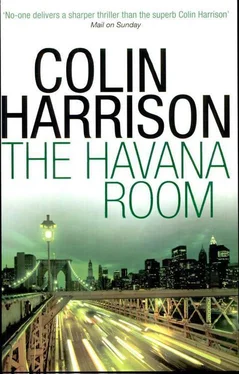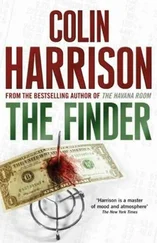Colin Harrison - The Havana Room
Здесь есть возможность читать онлайн «Colin Harrison - The Havana Room» весь текст электронной книги совершенно бесплатно (целиком полную версию без сокращений). В некоторых случаях можно слушать аудио, скачать через торрент в формате fb2 и присутствует краткое содержание. Жанр: Триллер, на английском языке. Описание произведения, (предисловие) а так же отзывы посетителей доступны на портале библиотеки ЛибКат.
- Название:The Havana Room
- Автор:
- Жанр:
- Год:неизвестен
- ISBN:нет данных
- Рейтинг книги:5 / 5. Голосов: 1
-
Избранное:Добавить в избранное
- Отзывы:
-
Ваша оценка:
- 100
- 1
- 2
- 3
- 4
- 5
The Havana Room: краткое содержание, описание и аннотация
Предлагаем к чтению аннотацию, описание, краткое содержание или предисловие (зависит от того, что написал сам автор книги «The Havana Room»). Если вы не нашли необходимую информацию о книге — напишите в комментариях, мы постараемся отыскать её.
The Havana Room — читать онлайн бесплатно полную книгу (весь текст) целиком
Ниже представлен текст книги, разбитый по страницам. Система сохранения места последней прочитанной страницы, позволяет с удобством читать онлайн бесплатно книгу «The Havana Room», без необходимости каждый раз заново искать на чём Вы остановились. Поставьте закладку, и сможете в любой момент перейти на страницу, на которой закончили чтение.
Интервал:
Закладка:
"Yes?" I said.
She stared at me, mouth set.
"Something wrong?" I said.
"I don't know," she answered. "I heard something."
"Heard something?"
"About you, yes."
"What did you hear?"
She looked at my feet and at the expanse of floor between us, then back at me. "I heard that you killed a child and got away with it. That there wasn't enough proof to send you to the electric chair." She waited for my response, her hands on her hips, alert to her own bravery. "There are a lot of kids in this building, mine included, so-"
"So you wanted to know."
"Yes. That's right. Someone knew someone who knew you. They didn't tell me the exact connection."
I said nothing.
"Well?" her voice came back, more righteous now.
I took a step toward her so as not to raise my voice.
"Stay there!"
I stopped. "There was a terrible accident," I said.
"That's not what I heard."
"That's what happened. Believe me, I was there."
"I don't believe you. I think there's more to it than that."
I resented this lipsticked woman, whose name I did not know, I hated her nosy instincts, her ferocious willingness to make accusations on the flimsiest of information. She was a dangerous kind of person, but she was also trying to protect her children and the children of other parents, and I doubted that I'd have acted much differently if the tables had been turned. "It was a terrible accident," I repeated. "That's all I can tell you. It destroyed two families."
"It just can not have been that simple."
I started to move on.
"Wait a minute! I think you're going to have to explain yourself to the tenants' association."
"Oh?" I remembered their fliers in the lobby, concerning trash removal and where children's bicycles could be stored. "And what if they don't find my explanation satisfactory?"
"Then I guess you'll have to leave."
"My lease is with the building owners, not with the tenants' association," I noted.
At this the woman gave a tight ratlike smile. She was happy that I'd resisted. It meant that now there was an issue, something to pull at, to get the flesh to tear. "We'll see," she threatened. "We will most definitely see."
A flier appeared on the bulletin board the next day announcing "a meeting of tenants concerned about family safety issues." Two days later, the minutes of that meeting were posted, announcing that "there was unanimous agreement that there is an urgent need to alert building management about issues relating to the character and criminal histories of specific tenants."
This was an inquisition and a witch-hunt and a vampire-chase, conducted in daylight by people who meant well, and it was coming to get me. I donated the entire contents of my apartment- toys, furniture, kitchen things- to the Catholic church ten blocks to the north and moved out.
Yes, I hurriedly moved out, and I also moved down, where I hoped no one would know me, to a small third-story walk-up on Thirty-sixth Street between Eighth and Ninth Avenues in the garment district. It's a lousy area, one of the city's many pockets of dirty, congested nowhereness, a few blocks from the rump ends of Pennsylvania Station and Macy's. I rather liked its hulking, paint-peeling anonymity. You don't want to go there. It'd be a waste of energy- a neighborhood with no neighbors to speak of, just offset-printing shops squatting in looming ten-floor factories where long fluorescent tubes stay on all night and smoke vents elbow from opaque windows. A place where you can get an industrial sewing machine repaired in an hour, or a greasy breakfast for $1.50. Where tired men push racks of sequined blouses on rolling flat dollies or pile five dozen cellophaned office chairs on the street. At night, there's no interesting decadence, no glammy intrigue, just drifting, muttering shadows, many wandering to and from the Hotel Barbadour around the corner, one of the city's few remaining single-room residences. Sad, unsoaped people- tooth-pickers and flagellomaniacs. Hummers and have-nevers. My building, in the middle of the block, looked out on a parking garage where a tired woman in red pants gave blow jobs from inside her van to the clerks on their lunch hours. When they came out afterward into the sunlight, they paused to tug at their pants, look left and right, then went on. Sometimes the woman's children played outside the van while she was inside. Ninth Avenue provided a Laundromat, a deli, a newspaper shop, and a daily encounter with a big-armed Puerto Rican guy who appeared each morning, always with a White Castle coffee cup and often a black eye, singing off his drunk as he staggered in the sunlight. "I took on the Cubans," he'd cough, "I took on the Haitians. I'ma gonna kill everybody."
Yes, quite a comedown for old Bill Wyeth, someone who'd slept in twenty or thirty of the world's swankiest hotels (the Conrad in Hong Kong, the Connaught in London, the Ritz in Paris, etc.), yes sir, a fellow who'd even been to a White House dinner during the Clinton administration. (The forty-second president himself had come over to me, looming and squinty-eyed, red-nosed, and shaken my hand and said something in his moist, scratchy voice, Good to see you, we 'preciate your support, or some such as the White House staff photographers clicked away, but that was enough for me- as he knew. When the president shook Judith's hand, her ability to speak devolved into breathy, near-coital word-bits: "Yes, oh, I-! Thank you! Yes!" The cameras clicked, as they did with everyone whose hand he shook. The pictures of both of us with the president, grinning like maniacs, arrived in a large, crisp, unsmudged envelope exactly two days later, having been borne aloft on some special private presidential postal service, the return address on the envelope simply THE WHITE HOUSE in raised gray letters. Judith spent $600 having the photos framed and she took the one of her with Bill C. with her to San Francisco, and what happened to the other one, with me, was anyone's guess.)
I don't remember much from my first few weeks in the walk-up on Thirty-sixth Street, and the reason is simple: I discovered a bottle of Judith's old sleeping pills tucked into my running shoes and swallowed three or four of them a day. You don't kill yourself on that, not even close, not that I actually wanted to. The changes are subtle. You float as you sink. You watch television while sleeping. You actually feel your eyes roll back into your head and it is in no way objectionable. You forget to take off your socks before stepping into the bath. At some point I bought a mattress, a table, and a chair from a guy on the street. I ordered Chinese food every twenty hours or so. I didn't mind the cold ginger chicken, the ants. I shaved irregularly, I used a T-shirt as a pillowcase, I read the news backward.
In time the divorce papers came; I signed the red-flagged pages without reading them. No custody, arranged visitation. Our old apartment sold quickly, the money went straight to her lawyer. I didn't care. I thought Judith and Timothy should get every cent possible. My retirement savings, so carefully tended and weeded and worshipped, were subject to the division of property, and perhaps already knowing that I was incapable of labor, I agreed to the complete liquidation of all my accounts, subject, of course, to the resulting penalties and retroactive taxes. And after the division of this sum, I was left with enough money to squeak along for a while, a few years anyway.
This noble destruction of wealth soon proved to have been unnecessary; Judith's sudden and rather expeditious remarriage to a young technology entrepreneur relieved me (sadly, for it might have been a source of dignity) of the obligation of child support. I was left to live off my future. I preferred not to know anything about the new husband, but one day, while flipping through the financial-celebrity magazines at a newsstand, I came upon a portrait of him. It was a shock. The article, titled "Young Wizards on the Verge," explained why his new company was so sought after. It held the patent to some laser-data storage technology I didn't understand. Data storage, the country was obsessed with it, a new way to avoid death. The article included a glossy photo of the new husband. He was young. Surprisingly dopey-looking, even, neck too long, eyes too close together, maybe even a little cross-eyed, but decked out in a good suit that I'm sure Judith selected. The text said he was twenty-eight years old, had three advanced computer engineering degrees. Stanford, Caltech. A kid, almost. Another picture: wide-hipped and duck-footed. If I was a wrecked minivan, then he was a new laundry truck. Somehow Judith had smelled him out from across the country, and teased him with some of the good stuff. A wink and a wet smile and he's stump-staggering toward her on his knees. I hated his youth, his brain that understood obscure, fantastically valuable things. Did she suckle him, I wondered miserably, did she press that geeky, appreciative face into her buoyant breasts knowing that the rest of things would take care of themselves? Knowing he didn't have a hundredth of the danger or poisonous power of Wilson Doan, but not caring, and, for his part, did he feel that deep, peaceful slowing of the pulse, as I had once felt, Judith's large soft nipples touching the roof of my/his mouth, and did he then know, know, that he was home again, parked, garage door down, safe as he had not been since he was two years old, and that this woman, this mother-woman, would take care of him, force these lovely soft things against his face, for him to suck, if only he did what she wished, which was to hand over the money? Well, maybe. Or maybe Judith really loved him.
Читать дальшеИнтервал:
Закладка:
Похожие книги на «The Havana Room»
Представляем Вашему вниманию похожие книги на «The Havana Room» списком для выбора. Мы отобрали схожую по названию и смыслу литературу в надежде предоставить читателям больше вариантов отыскать новые, интересные, ещё непрочитанные произведения.
Обсуждение, отзывы о книге «The Havana Room» и просто собственные мнения читателей. Оставьте ваши комментарии, напишите, что Вы думаете о произведении, его смысле или главных героях. Укажите что конкретно понравилось, а что нет, и почему Вы так считаете.












